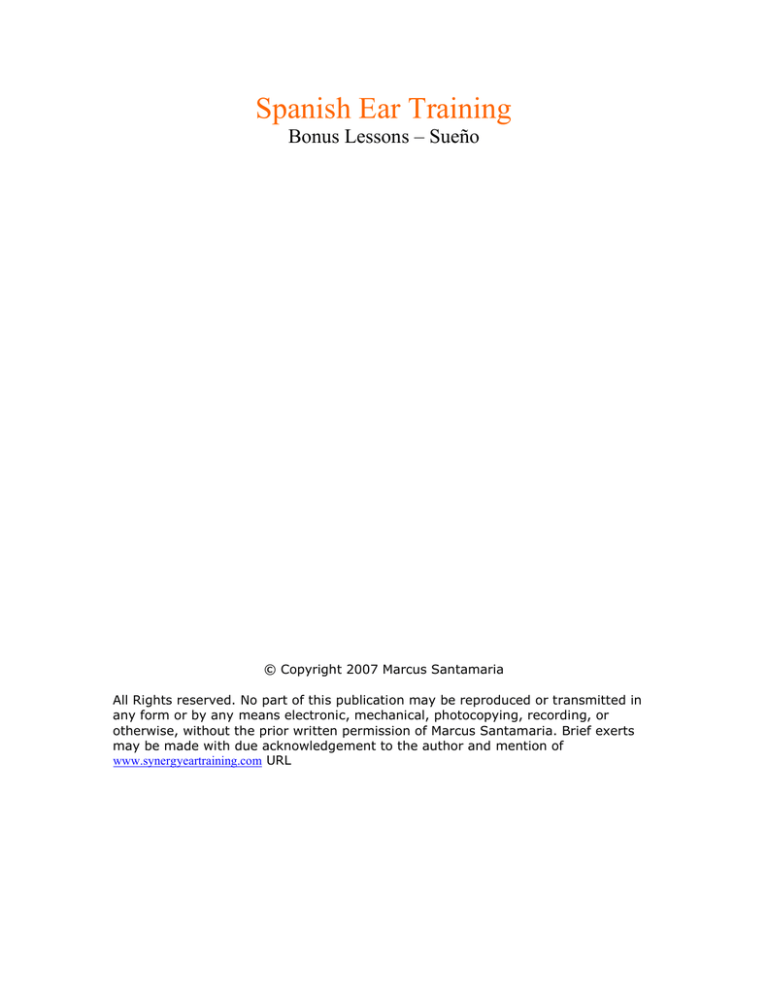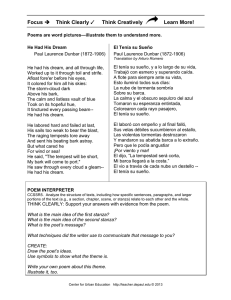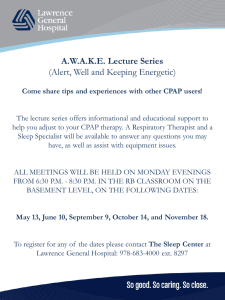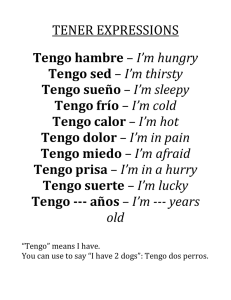Track 1 transcription - Spanish Ear Training
Anuncio

Spanish Ear Training Bonus Lessons – Sueño © Copyright 2007 Marcus Santamaria All Rights reserved. No part of this publication may be reproduced or transmitted in any form or by any means electronic, mechanical, photocopying, recording, or otherwise, without the prior written permission of Marcus Santamaria. Brief exerts may be made with due acknowledgement to the author and mention of www.synergyeartraining.com URL Track 1 Feature words cansado (a) - tired trabajé – I worked frontera – border acostarme – to lie (myself) down/I go to bed sueño – dream/sleepy cruzar – to cross pesadilla - nightmare Two Spanish Words - One English Word In English we often use the word tired to mean physically tired, worn out or run down. We also use tired to describe a sleepy state or sleepiness. In Spanish these two types of tired are distinguished clearly. Estoy cansado(a) I am tired (weary/worn out) Tengo sueño I am sleepy Notice that the literal translation of tengo sueño is I have dream, however the figurative translation, “I am sleepy” is the real meaning it conveys. Track 1 transcription In Spanish to say, I am tired, you say Estoy cansado. Or, if you are a female Estoy cansada. Say, I am tired. Estoy cansado/a. Listen to the Spanish for, the dream. El sueño Say, the dream. El sueño In Spanish to say, I am sleepy, you say, I have dream. Can you say, I am sleepy? Tengo sueño. And to say, I am very sleepy, you say, I have a lot of dream. Say, I’m very sleepy. Tengo mucho sueño. In Spanish, if you want to say, I am tired, and the tiredness is in your body, you say Estoy cansado. So you can be tired without wanting to sleep. Maybe you’ve had a hard day at work or you’ve gone for a run. Estoy cansado. Do you know how to say, I worked? Trabajé. Say, I worked a lot. Trabajé mucho. Say, I am tired Estoy cansado Because Porque I worked a lot. Trabajé mucho. And put that all together. Say, I’m tired because I worked a lot. Estoy cansado porque trabajé mucho. Now if you’re sleepy tired, in Spanish you would say, I’m sleepy. Tengo sueño. Say, I’m very sleepy. Tengo mucho sueño. In English we say, I’m going to bed. Me voy a la cama. but the more common expression in Spanish is to say, I’m going to lie myself down. Voy a acostarme. Listen to, to lie myself down. Acostarme Say, to lie myself down. Acosatarme Say, I’m going to lie down. Voy a acostarme. Say, I am sleepy. Tengo sueño. Say, I’m going to lie down. Voy a acostarme. Say, I am sleepy. I’m going to lie down. Tengo sueño. Voy a acostarme. Remember, literally we are saying, I’m going to lie myself down but expressively we’re saying, I’m going to bed. Say, I’m going lie down early. Voy a acostarme temprano. Say, I’m going to lie down early tonight. Voy a acostarme temprano esta noche. Say, I’m very sleepy. Tengo mucho sueño. I’m going to lie down early tonight. Voy a acostarme temprano esta noche. Say, I’m very tired. Estoy muy cansado. Say, I’m tired because I worked a lot. Estoy cansado porque trabajé mucho. Say, I’m tired because I worked a lot today. Estoy cansado porque trabajé mucho hoy. Say, dream. Sueño Say, the dream. El sueño Say, the American dream. El sueño americano Say, many people Mucha gente Go to Tijuana Va a Tijuana In order to Para Listen to, to cross. Cruzar Say, in order to cross. Para cruzar To say, the border, in Spanish, you say, the frontier. La frontera Say, the border. La frontera Say, in order to cross the border. Para cruzar la frontera Say, many people Mucha gente With the American dream Con El sueño americano Go to Tijuana Va a Tijuana In order to cross the border. Para cruzar la frontera. But many times Pero muchas veces The dream El sueño Listen to the Spanish for, nightmare. Pesadilla Say, nightmare. Pesadilla Say, the dream is a nightmare. El sueño es una pesadilla. Say, many people with the American dream Mucha gente con el sueño americano Go to Tijuana Va a Tijuana In order to cross the border Para cruzar la frontera But many times Pero muchas veces The dream is a nightmare. El sueño es una pesadilla. Track 2 Feature words ligero - light contigo – with you (informal) un sueño hecho realidad – a dream come true profundo – deep pesado – heavy Track 2 transcription Listen to the Spanish for, light. Ligero Say, light. Ligero Say, light sleep. Sueño ligero In Spanish to say, I am a light sleeper, you say, I have the light sleep. Tengo el sueño ligero. Say, I’m a light sleeper. Tengo el sueño ligero. Listen to the Spanish for, heavy. Pesado Say, heavy. Pesado Say, the heavy sleep. El sueño pesado And just like a light sleeper, to say, I’m a heavy sleeper, you say, I have the heavy sleep. Say, I am a heavy sleeper. Tengo el sueño pesado. In Spanish to say, deep, you say, profund. Profundo Say, deep. Profundo Say, the deep sleep. El sueño profundo How would you say, I’m a deep sleeper? Tengo el sueño profundo. Say, it is a dream. Es un sueño. Say, it is a dream to be here Es un sueño estar aquí With you all. con ustedes. Say, it is a dream to be here with you all. Es un sueño estar aquí con ustedes. Do you remember the “idad” category of words from Shortcut to Spanish? How would you say, reality? Realidad In Spanish to say, a dream come true, you say, a dream made reality. Un sueño hecho realidad Say, a dream come true. Un sueño hecho realidad Say, it is a dream come true Es un sueño hecho realidad To be here with you. Estar aquí con usted. Say, it is a dream come true to be here with you. Es un sueño hecho realidad estar aquí con usted. Listen to the informal way of saying, with you. Contigo Say informally, with you. Contigo Now imagine you’re speaking to a good friend and say, to be here with you. Estar aquí contigo Say to your good friend, it’s a dream come true Es un sueño hecho realidad To be here with you. Estar aquí contigo. Say, it’s a dream come true to be here with you. Es un sueño hecho realidad estar aqui contigo.



